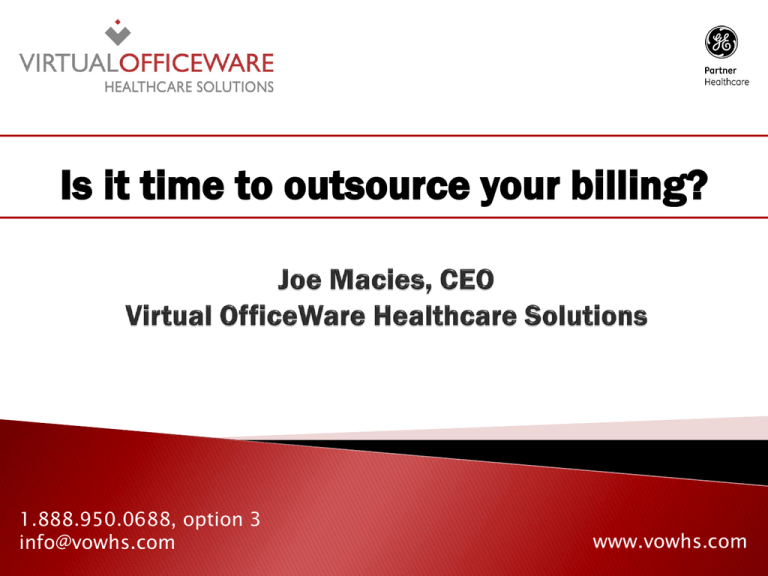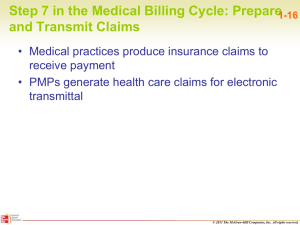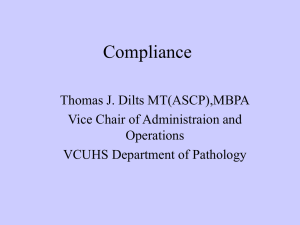C-EDI-Presentation-Slides
advertisement

Is it time to outsource your billing? 1.888.950.0688, option 3 info@vowhs.com www.vowhs.com A GE Healthcare Centricity Practice Solution’s partner, providing best practice solutions fitting the needs of today’s healthcare professionals. Specialize in EHR and Practice Management technology Provide full service resources that include software implementation, personalized training, custom development and 100% U.S. based help desk support. Factors to Consider in Outsourcing Advantages and Disadvantages of Outsourcing Hypothetical Example Factors to Consider in Selecting an RCM Company Q&A One of the many business questions physicians face is whether to outsource their medical billing to third-party medical billing services or do it in-house with medical billing software. 1. Your billing process is inefficient. If you’ve been watching your collections drop while the time to collect increases, you may have issues in your billing department. Outsourcing to a third-party billing service typically decreases the number of rejected claims and decreases the time it takes to receive payment from a payer. 2. You have high staff turnover. Turnover is an issue in any industry but turnover in a provider’s billing department is especially damaging. Claim processing is the economic life blood of a practice and a new addition or replacement in the billing department will inevitably lead to slowdown in the processing of claims. 3. You’re not tech savvy. Keeping your billing in-house will require an investment in practice management software. Add in training for your staff and the significance of this investment becomes clearer. If you don’t want to deal with software upgrades and occasional technical issues, outsourcing is probably a good choice. 4. You’re a new provider. New providers have plenty to learn and worry about aside from their billing. Outsourcing their billing right off the bat can give them much needed relief from the day-to-day stress of launching a new practice, without a trial by fire in hiring, training and managing employees. 5. You have different priorities. Many doctors are not strong on the business side of running a practice. They became doctors to help patients – not worry about the administrative/clerical side of the business. Outsourcing the billing process eliminates the hassle and frees doctors to concentrate on patients. 6. ICD-10 While the formats of the codes are similar formats, they are substantially different for the new set. Affects Medicare and Medicaid claims & also anyone else covered by Health Insurance Portability Accountability Act (HIPPA). Huge learning curve & time-intensive for your staff and very costly. The AMA has estimated cost range from $56,639 for small practices to millions of dollars for larger practices. Medicare and Medicaid has estimated denial rates 100-200% higher than normal. How many practices can sustain those type of denial rates? 7.Cost For many practices, the outsourcing decision boils down to one factor: cost. More focus on core business – Patient Care Complex technology Fewer billing errors Improves cash flow Increases revenue Economies of scale Pay on collected revenue only ICD-10 Better trained specialists Cost Less control Potential HIPAA Privacy and security breaches Possible hidden costs No flexibility Contractual misunderstandings Not focused on collecting all the money Contractual commitment. Divorce can be messy Cost For many practices, the outsourcing decision boils down to one factor: cost. To help compare the costs of in-house billing versus outsourced billing, we’ve created a hypothetical, three-physician practice. Here are the characteristics of this practice: ◦ ◦ ◦ ◦ ◦ Three primary care physicians; Two medical billing specialists; 80 insurance claims filed per day (~20,000 per year); $125 billed per claim on average (~$2,500,000 per year); and, We assume that the billing service has a high collection rate on claims. Can’t manage what you cannot measure Establish performance criteria reporting data, (WIP, AR, Rejections, Resubmissions) Risk sharing payment terms based on outcomes/results. Baseline plus bonus and penalties. (e.g. % billed vs. % collected, AR aging, amount in WIP) Vendor experience with your billing system Vendor experience with your specialty Roles and responsibilities outside of RCM Medical billing service isn’t a silver bullet for inhouse billing issues. Billing services can vary widely in their efficiency and accuracy when processing claims. If a provider chooses a billing service that is lax and prone to errors, the headaches surrounding billing issues won’t get better – they’ll get worse. It’s important for a practice to factor in their individual costs and preferences when deciding whether or not to outsource their medical billing. In an apples-to-apples comparison, we found that outsourcing had the higher net income. However, cost isn’t the only issue practices should consider. There are plenty of other factors involved in this business decision that may be as – if not more – important than costs.








